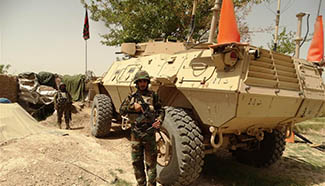by Sylvia B. Zarate
BOGOTA, July 18 (Xinhua) -- Almost two weeks after the Colombian government and the FARC guerrilla group announced a historic end to their armed conflict in Havana, Cuba, concerns are mounting that not all FARC members are keen on giving up their struggle.
On July 6, the Armando Rios First Front, one of the main blocs of the revolutionary group, released a statement that it would not lay down its arms.
"The Armando Rios First Front has decided not to demobilize. We will continue the fight to take power, by the people and for the people, independently of the decision taken by the rest of the members of our organization," said the statement.
The First Front has around 350 members and operates in the departments of Vaupes, Guaviare and Guainia. It is best known for having kidnapped Colombian-French politician Ingrid Betancourt, a former senator, whom they kept in captivity for over six years from 2002-2008. It is thought this group is mainly financed through drug trafficking and illegal mining.
President Juan Manuel Santos immediately responded to their declaration, saying that "certain people within the FARC's First Front have doubts about whether to join the peace process or not. Those with doubts should leave them aside and join us, as this is their last chance to change their life. Otherwise, I assure them they will end either in a grave or in jail."
The ruling body of the FARC also issued a statement, saying that no decisions taken by the First Front could be carried out with the name, the weapons or the assets of the rebel group.
"The fighters of the First Front have decided to give up their principles and are using ideological and political arguments to try and hide the obvious influence of those who have economic interests in not ending the conflict," said the group.
The First Front's main complaint is that, according to the Havana deal, all FARC guerrillas would have to stay for 180 days in a number of camps to guarantee the disarmament process.
"The concentration areas are for defeated guerrillas. The Armando Rios First Front of the FARC has never suffered a military defeat. Any ordinary Colombian will understand that these zones are open-air prisons. Surely, nobody will want to enter these traps," read the statement.
According to this offshoot of the FARC, the government of President Juan Manuel Santos is only seeking to disarm the rebels without seeking a real solution to Colombia's economic and social problems.
The First Front also invited all guerrillas who disagree with the peace deal to join forces with them and keep fighting.
In an interview with Xinhua, Alirio Uribe, a lawmaker for the left-wing Alternative Democratic Pole, stated that it was natural for differences to appear in any peace process.
"I believe this does not hurt the success of the negotiations which took a lot of effort. I think the FARC is a very hierarchical organization...which can guarantee that most of its blocs will demobilize," said Uribe.
However, Uribe warned that the full impact of the peace process and the opposition to it will only be measured once the disarmament process finishes in the concentration zones.










